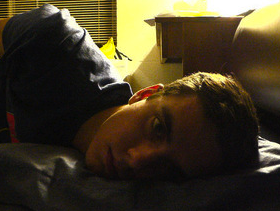
Photo credit: Scuddr on Flickr
If you’re not getting enough, it’s important to find out why. That’s because lack of sleep is a serious safety issue that affects workers in all industries.
“The less sleep you get, the more likely you are to have an accident at work,” says Pat Byrne, an international expert in fatigue risk management, who spoke to logging industry delegates at the 2013 Vancouver Island Safety Conference.
“Our message was that the forest industry needs to pay attention to that and start looking at why it’s an issue,” said Pat, also known as the Canucks sleep doctor.
Pat and his team at Fatigue Science work with industry, unions, and professional sports teams including the NHL, NBA, CFL, national soccer leagues, and other teams in Europe and Australia.
They use a tool called the ReadiBand™ for screening day-to-day sleep quality, quantity and timing. It’s a light-weight strap worn on the wrist, like a watch, approved by Health Canada and the FDA. It monitors wrist movements to detect sleep and wake periods, recording data that becomes the first step towards a solution like a sleep clinic or lifestyle changes.
3 reasons people aren’t sleeping enough
Pat described them to me over the phone when I called to find out more about his message to industry. They are as follows:
1) Biological sleep disorders
Pat said they are prevalent in our society – affecting up to 35 percent of the population. Up to 90 different sleep disorders, including restless leg syndrome and sleep apnea, may be the cause – and “people may not know if they have them or not,” he said.
2) Work scheduling
Some schedules don’t provide enough opportunity for sleep – especially for people who travel and/or do shift work.
3) Lifestyle
Late nights on Facebook, YouTube, and online games are big culprits. Some of us are woken by small children, while others toss and turn with a mind full of stress and worry.
Turning off the computer earlier is an obvious solution. Studies on how soon before bed are “all over the map” Pat said, when I asked him about this.
“They generally say for an hour before your normal bed time, you should just get away from the computer – not just because of the light exposure but because it stimulates your brain,” he said. Check out the CCOHS article Fatigue for more tips on getting high-quality sleep.
As for the stress, we can find ways to cope and realize we’re not alone. Our inner strength, loved ones, and communities are there to help; you just need to find them, and one (of many) good starting points is Stress Management from HealthLinkBC.
As for the small children… you tell me! 😉


